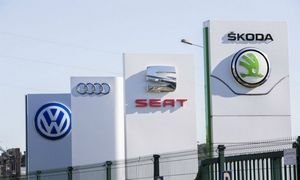Germany to accept diesel software fix rather than retrofit millions of cars

The sources were speaking before a summit of politicians and car executives scheduled for Wednesday to discuss ways to cut inner-city pollution to try to head off bans on diesel cars — a sensitive issue ahead of national elections next month.
The summit must also start to restore the reputation of one of Germany's major industries which has been badly tarnished since the Volkswagen emissions scandal broke in September 2015.
The auto industry has agreed to software updates for around 2 million cars that will cost around 300 million euros ($354 million), a government source said. An industry source said foreign car makers had not agreed to participate for now.
The deal suggests the industry has headed off demands for hardware upgrades that would cut more pollution but would also be much more expensive — with the potential costs as high as 10 billion euros.
The deal also foresees a range of other measures to reduce emissions, the sources said, such as subsidies for electric buses, taxis and other municipal vehicles, as well as a commitment to increase the number of charging stations.
The sector and the government will each contribute half to a 500 million euro fund aimed at helping local governments reduce pollution, blamed for causing respiratory diseases.
CITY BANS
The compromise might not cut emissions enough to stop bans of diesel cars in German cities - like the one in Stuttgart confirmed by a regional court last week.
DUH, the environmental lobby group that brought the Stuttgart case, has said it wants moves to go beyond voluntary software updates or it will take further legal action.
Chancellor Angela Merkel's conservatives have come under fire from consumer and environmental groups as well as opposition lawmakers for their close links to carmakers.
"The car industry can always rely on the support of the government when things get difficult," said Timo Lange, a campaigner with LobbyControl, a non-profit group.
Transport Minister Alexander Dobrindt rejected suggestions on Tuesday that he is too closely tied to the industry.
The Environment Ministry has already made clear that software improvements can only be a first step as they reduce nitrogen oxide emissions by about 25 percent on average.
The government is also demanding that auto makers finance their own schemes to encourage drivers to switch to newer, cleaner models, an implicit rejection of calls by some politicians for state subsidies.
On Tuesday, Ford announced it will pay owners of older vehicles designed to meet the Euro-1, Euro-2 or Euro-3 emission standards a bonus between 2,000 euros and 8,000 euros if they trade in their old cars and buy a new model by the end of 2017.
Related News
